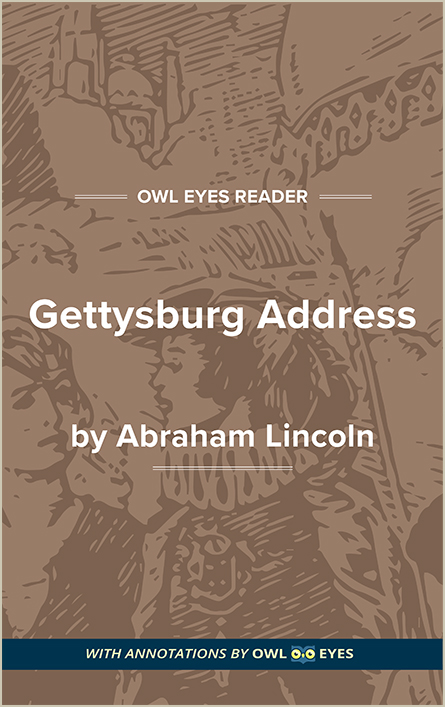Analysis Pages
Rhetorical Devices in Gettysburg Address
Brevity: Lincoln delivered his speech near the end of the consecration ceremony. Before his address, statesman Edward Everett delivered a 13,000-word, two-hour speech entitled “The Battles of Gettysburg,” intended to be the featured address of the day. In stark contrast, Lincoln’s speech, at only 250 words, was over in two minutes. The audience was astounded by Lincoln’s brevity. Yet the concision of the speech has contributed to its lasting power.
Repetition: One of the key rhetorical devices Lincoln employs in the Gettysburg Address is repetition. At several points through the speech, Lincoln constructs successions of phrases which follow the same structure and which build toward a unified effect. One such example is “that government of the people, by the people, for the people,” which has entered the American lexicon for its forcefulness and memorability.
Appeals to Nationalism and to American Values: Much of the rhetorical power of the Gettysburg Address comes from the way Lincoln appeals to his audience’s sense of national identity and pride. Lincoln’s intent is to underscore the worthiness of the American experiment and of the values set forth by the founding fathers: liberty, equality, and democracy. By focusing on the nobility of the nation’s ideals, Lincoln succeeded in framing the necessity of the war and the meaning of the lives lost.
Rhetorical Devices Examples in Gettysburg Address:
Text of Lincoln's Speech
🔒"We are met on a great battle-field of that war..." See in text (Text of Lincoln's Speech)
"or any nation so conceived and so dedicated, can long endure..." See in text (Text of Lincoln's Speech)
"Four score and seven years ago our fathers brought forth..." See in text (Text of Lincoln's Speech)
"of the people, by the people, for the people,..." See in text (Text of Lincoln's Speech)
"and that government..." See in text (Text of Lincoln's Speech)
"a new birth of freedom..." See in text (Text of Lincoln's Speech)
"in vain..." See in text (Text of Lincoln's Speech)
"we take increased devotion to that cause for which they gave the last full measure of devotion..." See in text (Text of Lincoln's Speech)
"nor long remember what we say here, but it can never forget what they did here...." See in text (Text of Lincoln's Speech)
"far above our poor power to add or detract..." See in text (Text of Lincoln's Speech)
"hallow..." See in text (Text of Lincoln's Speech)
"we can not dedicate..." See in text (Text of Lincoln's Speech)

